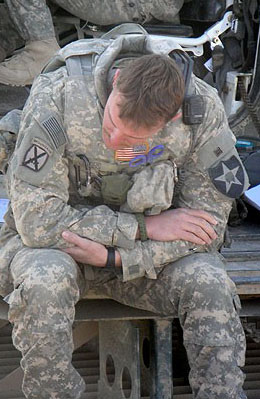By Hal Bernton

Staff Sgt. Gibbs in the back of a Stryker vehicle, a pair of scissors visible in the top pocket of his uniform. Gibbs allegedly used a pair of medic’s shears to cut off the finger of at least two Afghan civilians murdered by members of his platoon. (Photo: Rolling Stone)
A fellow soldier testified that Staff Sgt. Calvin Gibbs pulled out a tooth from an unarmed Afghan villager who had just been killed and offered it to him.
"I didn't say no. I just said, 'Yeah. I will get it later.' Then I didn't," Pvt. Adam Winfield testified Wednesday.
In the third day of court-martial proceedings against Gibbs, Winfield gave a chilling account of the May 2010 slaying staged to look like a legitimate combat death.
Winfield, who has pleaded guilty to involuntary manslaughter in the case, says the killing was organized by Gibbs and known to a wider circle of soldiers in a troubled Joint Base Lewis-McChord platoon serving in southern Afghanistan.
Gibbs, a squad leader, is charged with the murders of three Afghan villagers, in the winter and spring of 2010, and other crimes. He has pleaded not guilty to all charges. Gibbs' attorneys say their client played no role in the May killing and one earlier in the year. They contend the killing of a villager in March was in self-defense.
In one of the most prominent war-crimes cases to emerge from the conflict in Afghanistan, Winfield and two other soldiers in the platoon have pleaded guilty to participating in one or more of the slayings.
Gibbs' attorneys have said their client has been framed by other platoon members in the "ultimate betrayal of an infantryman."
Some of the prosecutors' strongest evidence appears to involve the May slaying, with Winfield and a second soldier, Pvt. Jeremy Morlock, both pleading guilty to their roles in the villager's death.
Both Morlock and Winfield said Gibbs tossed a grenade at the victim, then ordered them to fire from a prone position some distance away. They say Gibbs approached the villager and fired two head shots into the victim's prostrate body.
Winfield, who agreed to testify in a plea deal, said he aimed high when he fired his weapon at the villager.
Defense attorneys have maintained that Morlock and Winfield carried out this killing with no assistance from Gibbs. They are scheduled to begin their cross-examination of Winfield on Thursday.
Several witnesses this week have testified that the motivations for the killings emerged from a toxic mix of boredom, frustration over the difficulties in engaging an unseen enemy, and a dehumanizing view of Afghans.
After Winfield expressed concern about the circumstances of a January killing, Gibbs said it didn't matter because Afghans were "savages," according to Winfield's testimony.
After the May killing of the Afghan villager — a man who Winfield testified was pulled from his family compound and executed — family members gathered at the scene.
A prosecutor asked Winfield how they reacted.
"Terror. They just started screaming and crying," he said.



